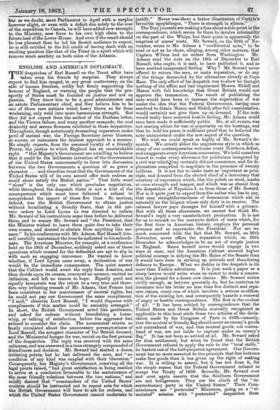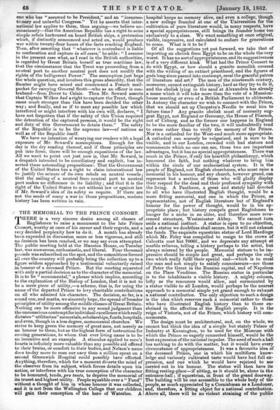ENGLISH AND AMERICAN DIPLOMACY.
rE despatches of Earl Russell on the Trent affair have taken even his friends by surprise. They always expect to find him ranged, in any great controversy, on the side of human freedom, coldly but firmly supporting the honour of England, or warning the people that the pro- sperity of States must be founded on justice and not on passion. They know him to be a good administrator and an astute Parliamentary chief, and they believe him to be one of those rare natures which heavy blows, so far from weakening, only weld into more harmonious strength. But they did not expect from the author of the Durham letter, and the Vienna failure, and many another escapade, the cool dexterity and serene firmness exhibited in these despatches. Throughout, though notoriously demanding reparation under peril of instant war, the Foreign Secretary never blusters, or sneers, or insinuates the faintest approach to a menace. He simply expects, from the assumed loyalty of a friendly Power, the justice to which England has an unmistakable right. "Her Majesty's Government are unwilling to believe that it could be the deliberate intention of the Government of the United States unnecessarily to force into discussion between the two Governments a question of so grave a character . . . and therefore trust that the Government of the "United States will of its own accord offer such redress as could alone satisfy the British nation." That little word 4` alone" is the only one which precludes negotiation, while throughout the despatch there is not a hint of the consequences which must have followed a refusal to comprehend the import of those five lines. So anxious, indeed, was the British Government to obtain justice without humiliating a friendly State, that in the pri- vate orders to Lord Lyons he was directed to inform Mr. Seward of his instructions some time before he delivered them, and to assure Mr. Seward and "the President, that the Minister wished to leave them quite free to take their own. course, and desired to abstain from anything like me- nace." Inhis conferences with Mr. Adams, Earl Russell him- self carefully maintained the tone he indicated to his subordi- nate. The American Minister, for example, at a conference held on the 18th of December, suddenly asked one of those questions which counsel for the defendant are apt to slip in with such an engaging innocence. He wanted to know whether, if Lord Lyons came away, a declaration of war would be the immediate consequence. The quiet answer that the Cabinet would await the reply from America, and then decide upon its course, conveyed no menace, excited no irritation, and left no reason to hope. Equally good and equally temperate was the retort to a very true and there- fore very irritating remark of Mr. Adams, that France had been consistent in her maintenance of neutral rights, but he could not pay our Government the same compliment. " I said," observes Lord Russell, "I would dispense with compliments if this matter could be amicably arranged." In short, the British Government acted like gentlemen, and asked for redress without brandishing a horse- whip, or talking of satisfaction before the aggressor had refused to consider the claim. The nonsensical stories so busily circulated about the unnecessary peremptoriness of Lord Russell, the arrogant character of the British demand, and the Ministerial hunger for war, vanish on the first perusal of the despatches. The reply was received with the same calmness, and was answered in a tone strangely compounded of friendliness and decision. Mr. Seward had started a dozen irritating points, but he had delivered the men, and "no condition of any kind was coupled with their liberation." Consequently, her Majesty's Government, reserving all the legal points raised, "had great satisfaction in being enabled to arrive at a conclusion favourable to the maintenance of the most friendly relations between the two nations," and mildly desired that "commanders of the United States' cruisers should be instructed- not to repeat acts for which the British Government will have to ask for redress, and which the United States Government cannot undertake to
justify." Never was.there a better illustration of Carlyle's favourite apophthegm, "There is strength in silence."
The Tory journals are making a fuss about a side point in the correspondence, which seems to them to involve criminality on the part of the Whigs, but their point is apparently the emptiest of mares' nests. Mr. Seward, on the 30th of No- vember, wrote to Mr. Adams a "confidential note," to be read or not as he chose, alleging, among other matters, that Captain Wilkes had no orders from Washington. Mr. Adams read the note on the 16th of December to Earl Russell, who ought, it is said, to have published it, and so have soothed exasperated feeling. Why ? Mr. Seward never offered to return the men, or make reparation, or do any of the things demanded by the ultimatum already at Cape Race. The only effect of his despatch was to show he thought nothing of the affair, and had imprisoned Messrs. Slidell and Mason with full knowledge that Great Britain would not approve the transaction. The result of publishing the note would have been to increase the expectation of war under the idea that the Federal Government, having once resolved to detain Mason and Slidell, after fall consideration, would certainly not give them up on demand. If the note would really have removed hostile feeling, Mr. Adams could soon have made it sufficiently public. He, at all events, was not craving either for war or popularity on the hustings, and that he held his peace is sufficient proof that he believed the note unimportant under the new aspect of the question. We wish we could speak as highly of Mr. Seward's de- spatch. We utterly abhor the ungenerous style in which so many of our contemporaries welcome every Northern defeat, and exaggerate every American concession. We hold ourselves bound to make every allowance for politicians hampered by a civil war whichithey certainly did not commence, and for di- plomatists compelled to negotiate in the presence of twenty millions. It is not fair to make taste as important as prin- ciple, and demand from the elected chief of a democracy that courtesy of expression which, like the polish on steel, marks at once strength and temper, and which was as absent from the despatches of Napoleon I. as from those of Mr. Seward. Nor is it quite just to expect from the suitor who has to pay, that easy straightforwardness of demeanour which sits so naturally on the litigant whose only duty is to receive. The calmest lawyer pays damages for himself with a grimace. But with all these allowances, we cannot but think Mr. Seward's reply a very unsatisfactory production. It is not for us to remark on the eccentric defect of taste which, for the first time in American history, employs the personal pronoun and so supersedes the President. Nor are we much concerned with the fact that Mr. Seward, on 30th November, never offers the reparation which, on 26th December he acknowledges to be an act of simple justice to England. Rome herself never would engage in two wars at once, and the American Cabinet showed higher political courage in defying the Mr. Hales of the Senate than it would have done in striking an attitude and thundering defiance to Europe.. What we dislike in the despatch is its more than Yankee adroitness. It is just such a paper as a sharp lawyer would write when he meant to make a conces- sion the ground for a dozen new claims. Mr. Seward writes civilly enough, as lawyers generally do, but he contrives to insinuate into his letter no less than five distinct and sepa- rate claims, every one of which involves a serious modifica- tion of the existing law, and consequently hazards a renewal of angry or hostile correspondence. The first is the coolest of all : "It has been settled by correspondence that the United States and Great Britain mutually recognized as applicable to this local strife these two articles of the decla- ration made by the Congress of Paris in 1856—namely, that the neutral or friendly flag should cover an enemy's goods not contraband of war, and that neutral goods, not contra- band of war, are not liable to capture under an enemy's flag." It has not been so settled at all. Mr. Seward asked for that settlement, but when he found that the British Government refused to apply the rule to the "local strife," he backed out of the half-prepared agreement. Our Govern- ment has no more assented to the principle that free bottoms make free goods than it has given up the right of making war. It is willing to assent, but it has not done it, for the simple reason that the Federal Government refused to accept the Treaty of 1856. Secondly, Mr. Seward over and over again asserts that the Southern Government are not belligerents. They are the chiefs of the "in- surrectionary party in the United. States." Their Com- missioners are "pretended" Ministers, going on a "si- mulated" mission with "pretended" despatches from one who has "assumed to be President," and an "insurrec- tionary and unlawful Congress." Yet he asserts that inter- national law applies to them, thus arguing—we believe un- consciously—that the American Republic has a right to seize simple rebels harboured on board British ships, a pretension which, if distinctly announced and acted on, would produce war within twenty-four hours of the facts reaching England. Then, after asserting that "whatever is contraband is liable to confiscation and capture in all eases," he adds : "I assume in the present case what, as I read in the British authorities, is regarded by Great Britain herself as true maritime law, that the circumstance that the Trent was proceeding from a neutral port to another neutral port does not modify the rights of the belligerent Power." The assumption just begs the whole question, and involves this gross absurdity, that the Sumter might have seized and condemned a French mail- packet for carrying General Scott—who as an officer is con- traband—from Dover to Calais. Then Mr. Seward asserts that Captain Wilkes had a right to capture the Trent, though cases much stronger than this have been decided the other way ; and finally, and as if to meet any possible law which interfered or might interfere with his own will, declares, "I have not forgotten that if the safety of this -Union required the detention of the captured persons, it would be the right and duty of this Government to detain them." The safety of the Republic is to be the supreme law—of nations as well as of the Republic itself. We have no intention of wearying our readers with a legal , exposure of Mr. Seward's assumptions. Enough for the day is the dry reading thereof, and if these principle o are put into force, there will be enough expositions of the law. .All we want to point out just now ip, that Mr. Seward, in a despatch intended to be conciliatory and explicit, has in- serted these astounding propositions : That the Government of the United States has a right to claim international law to justify the seizure of its own rebels on neutral vessels ; that the sailing of a neutral from neutral port to neutral port makes no difference in its liability ; and that it is the right of the United States to act without law or against law if Mr. Seward's idea of its safety so require. If there are not the seeds of many a war in those propositions, modern history has been written in vain.































 Previous page
Previous page